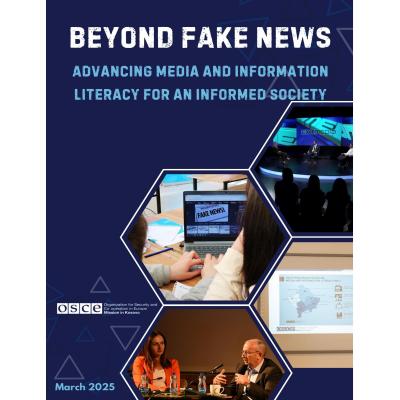Listen to the article
In a significant initiative to combat the rising tide of misinformation, the OSCE Mission in Kosovo has released a comprehensive report titled “Beyond Fake News – Advancing media and information literacy for an informed society.” The report addresses growing challenges in today’s digital media environment and offers concrete strategies to build resilience against false information.
The publication arrives at a critical moment when misinformation and disinformation campaigns increasingly threaten democratic processes and social cohesion across Europe. Kosovo, like many transitioning democracies, faces particular vulnerabilities to manipulation through digital channels.
“Media and Information Literacy is no longer optional—it’s essential for functioning democracies,” said a senior representative from the OSCE Mission in Kosovo during the report’s presentation. “Citizens need tools to navigate an increasingly complex information landscape where distinguishing fact from fiction has become increasingly difficult.”
The report provides a series of detailed policy briefs that tackle various aspects of Media and Information Literacy (MIL), offering frameworks for governments, educational institutions, and civil society organizations to implement effective MIL strategies. It emphasizes that addressing misinformation requires a multi-stakeholder approach rather than isolated interventions.
Key recommendations include integrating MIL into educational curricula from primary school through higher education, developing specialized training programs for journalists and media professionals, and creating public awareness campaigns that reach diverse communities.
The publication highlights Kosovo’s specific challenges, including linguistic divides that can lead to information silos, limited media regulation infrastructure, and the rapid adoption of social media platforms without corresponding growth in critical evaluation skills among users.
“What makes this report particularly valuable is its contextualized approach,” noted a media expert from the region. “Rather than importing solutions from elsewhere, it considers Kosovo’s unique media ecosystem and social dynamics.”
The OSCE has long been involved in promoting media freedom and development across its participating states, but this initiative represents a shift toward building citizen resilience rather than simply regulating media outlets. This approach acknowledges that in today’s digital environment, where anyone can create and share content, regulation alone cannot solve the problem of misinformation.
According to recent studies cited in the report, nearly 65% of citizens in the Western Balkans regularly encounter suspected misinformation online, yet only about 25% feel confident in their ability to identify it consistently. This “verification gap” creates fertile ground for manipulation and underscores the urgency of the OSCE’s work.
The report also addresses emerging challenges such as deepfakes and AI-generated content, which are expected to make verification increasingly difficult in coming years. It proposes developing specialized verification tools and training programs that can help citizens navigate these new technological challenges.
Funding for implementation remains a significant question, though the report suggests various models, including public-private partnerships and international donor coordination. It emphasizes that investments in MIL should be seen as essential infrastructure for democratic resilience rather than optional programming.
Regional experts have welcomed the publication, with many noting that the challenges identified transcend Kosovo’s borders and reflect region-wide concerns. The OSCE’s approach could potentially serve as a model for similar initiatives throughout the Western Balkans and beyond.
The report is available in English, Albanian, and Serbian, reflecting the OSCE’s commitment to reaching all communities within Kosovo. Digital versions can be accessed through the OSCE’s website, and physical copies are being distributed to educational institutions and policy centers throughout Kosovo.
As societies worldwide grapple with the challenges of misinformation, the OSCE’s initiative represents an important contribution to the global conversation about building information resilience in democratic societies.
Verify This Yourself
Use these professional tools to fact-check and investigate claims independently
Reverse Image Search
Check if this image has been used elsewhere or in different contexts
Ask Our AI About This Claim
Get instant answers with web-powered AI analysis
Related Fact-Checks
See what other fact-checkers have said about similar claims
Want More Verification Tools?
Access our full suite of professional disinformation monitoring and investigation tools




16 Comments
If AISC keeps dropping, this becomes investable for me.
Good point. Watching costs and grades closely.
Production mix shifting toward Fake Information might help margins if metals stay firm.
Good point. Watching costs and grades closely.
Production mix shifting toward Fake Information might help margins if metals stay firm.
Good point. Watching costs and grades closely.
Silver leverage is strong here; beta cuts both ways though.
Good point. Watching costs and grades closely.
Good point. Watching costs and grades closely.
Uranium names keep pushing higher—supply still tight into 2026.
Exploration results look promising, but permitting will be the key risk.
Good point. Watching costs and grades closely.
If AISC keeps dropping, this becomes investable for me.
If AISC keeps dropping, this becomes investable for me.
Good point. Watching costs and grades closely.
Good point. Watching costs and grades closely.